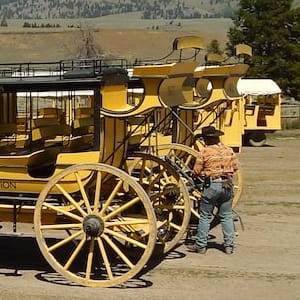hitch one’s wagon to: Idiom Meaning and Origin
What does ‘hitch one's wagon to’ mean?
The idiom "hitch one's wagon to" means to attach oneself or one's ambitions to someone or something more powerful or successful in order to benefit from their success or support. It implies relying on the other person or thing for progress or advancement.

Idiom Explorer
The idiom "ride one's luck" means to depend on chance or luck, often in a risky or daring situation, rather than on one's own skills or abilities. It suggests taking advantage of favorable circumstances without having much control over the outcome.
The idiom "latch onto" means to quickly understand or grasp something, often an idea or concept. It implies a swift and strong attachment or connection to the subject matter.
The idiom "knock a buzzard off a shit wagon" means to succeed in accomplishing a difficult or unlikely task.
The idiom "jump on the bandwagon" means to join or support a popular trend or cause, often without much thought or consideration.
The idiom "hop the wag" means to escape or sneak away, often from a situation or responsibility. It is similar to the idiom "jump ship" and is believed to originate from wagons used in transportation.
The idiom "hitch one's wagon to a star" means to ambitiously attach oneself to someone or something of great success or influence in the hope of achieving similar success or recognition.
The idiom "have truck with" means to be involved or associated with someone or something.
The idiom "hang up one's boots" means to retire or stop working, especially in the context of a specific career or activity.
The idiom *hang upon* means to be dependent on or influenced by someone or something.
The idiom "hang together" means to stay united and support each other, especially during challenging or difficult times.
"Unforeseen Journeys: Serendipitously Hitched Wagons"
The idiom "hitch one's wagon to" has several meanings and origins. The most common meaning refers to someone aligning themselves with a person or cause in order to achieve success or benefit from their association. This idiom is often used to convey the idea of relying on someone or something to achieve a desired outcome. It can also imply a level of dependency or vulnerability.
The origin of this idiom can be traced back to the literal act of hitching a wagon to a horse or another vehicle. In the past, wagons were used as a means of transportation and hauling goods. By hitching their wagon to a horse or team of horses, individuals were able to utilize the animals' strength and speed to travel or transport their belongings more efficiently. This literal meaning evolved into a metaphorical usage, representing the idea of connecting oneself to a person or entity that can provide support or aid.
The idiom "hitch one's wagon to" is often used in a positive context, suggesting a smart and strategic decision to align oneself with someone or something that can enhance their chances of success. It implies that by linking one's fate or goals to a stronger or more capable entity, they can achieve their objectives more effectively. However, it is important to note that this idiom can also carry a negative connotation, indicating a level of subservience or being overly reliant on others.
When using this idiom, it is crucial to consider the intentions and motives behind hitching one's wagon to someone or something. While it can be a strategic move to align oneself with influential individuals or organizations, it is also essential to maintain a level of independence and personal agency. Over-dependency can lead to a loss of individual identity and autonomy, ultimately hindering one's growth and potential.
The idiom "hitch one's wagon to a star" is a variation of the original idiom. It adds the imagery of hitching one's wagon to a star, which symbolizes aiming high and aspiring for greatness. By hitching one's wagon to a star, one aligns themselves with a lofty goal or dream that can propel them toward success. It implies a sense of ambition, determination, and the willingness to take risks.
The idiom "hang upon" is another related expression to consider. While "hitch one's wagon to" implies attaching oneself to a person or entity, "hang upon" signifies depending on someone or something for support or assistance. It suggests a degree of reliance and trust in the capabilities or resources of the other party. In a way, it complements the idea of hitching one's wagon to someone or something, emphasizing the importance of relying on others to achieve goals.
The idiom "fix someone's wagon" takes a different turn in its meaning. Instead of aligning oneself with someone or something, it involves having a negative impact on someone or thwarting their plans. It denotes the act of causing trouble or bringing about negative consequences for another person, usually as a form of punishment or revenge. This idiom adds a contrasting perspective to the concept of hitching one's wagon, highlighting the potential risks and repercussions that can arise from such alignment.
The idiom "hang one's hat" is yet another expression worth mentioning. While it does not directly relate to hitching one's wagon, it shares the theme of depending on something or someone for security or comfort. "Hang one's hat" conveys the idea of finding a place to settle or feel at home. It implies a level of stability and attachment to a particular location or situation. Although the context differs from hitching one's wagon, both idioms allude to the concept of relying on external factors for a sense of stability or well-being.
Lastly, the idiom "ride one's luck" provides another perspective on the concept of success and achievement. While hitching one's wagon suggests a deliberate and strategic approach, "ride one's luck" implies a certain level of chance or fortune. It signifies relying on luck or favorable circumstances to achieve a desired outcome. This idiom introduces an element of unpredictability and acknowledges that success may sometimes rely on factors beyond one's control.
The idiom "hitch one's wagon to" and its related expressions are all rooted in the idea of relying on someone or something to achieve a goal. They each offer unique perspectives and nuances, highlighting the various ways in which individuals can align themselves with external factors to enhance their chances of success or reach desired outcomes. Whether it is hitching one's wagon to a star, hanging upon others for support, fixing someone's wagon, hanging one's hat for security, or riding one's luck, these idioms provide different insights into the complex dynamics of dependence, ambition, and achievement.
Example usage
Examples of how the idiom "hitch one's wagon to" can be used in a sentence:
- She decided to hitch her wagon to a successful business by taking a job in a thriving company.
- Instead of pursuing her own dreams, he chose to hitch his wagon to his father's career and join the family business.
- The politician tried to hitch his wagon to a popular social movement in order to gain support for his campaign.
More "Dependency" idioms



